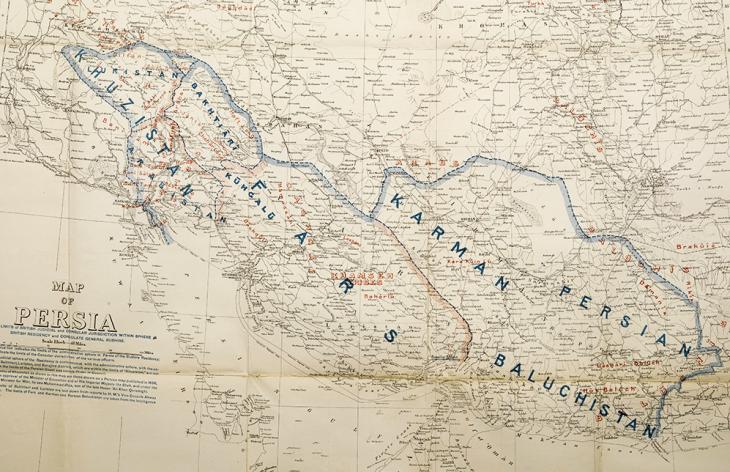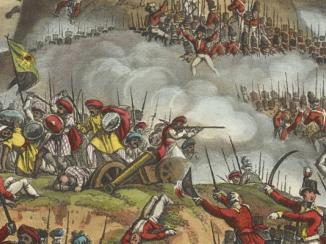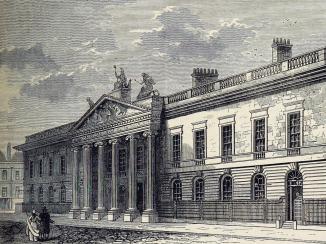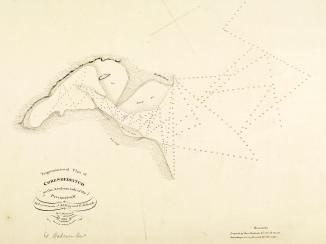Overview
From the early days of its existence, the East India Company sought a secure base, known as a factory An East India Company trading post. , from which to conduct trade with Persia. In 1763, it finally established a base which would provide some continuity to its operations, namely Bushire on the northeast coast of the Gulf, which during the eighteenth century developed into the most important port in Persia. It was well-positioned, being close to one of the two main routes from the coast into the interior of the country.
Favourable Conditions
The Company concluded an agreement with Shaikh Sa’don, the Governor of Bushire in April 1763 and was granted a firman A Persian word meaning a royal order or decree issued by a sovereign, used notably in the Ottoman Empire (sometimes written ‘phirmaund’). , or licence, three months later in which the company was given a monopoly on the import of woollen goods into Persia. The agreement – subsequently approved personally by the ruler of Persia, Karim Khan Zand – gave the Company favourable conditions for trade in the form of exemptions from export and import duties and protection for Company personnel and property. The new factory An East India Company trading post. was, however, abandoned for a period of time from 1769 and re-established in 1775.
Relationships with Basra and Bombay
The Resident at Bushire was immediately responsible to the Agent and Council at Basra through whom the whole of his correspondence with the Governor and Council at Bombay was normally channelled. This arrangement lasted until 1778 after which date the status of Basra was reduced from Agency An office of the East India Company and, later, of the British Raj, headed by an agent. to Residency An office of the East India Company and, later, of the British Raj, established in the provinces and regions considered part of, or under the influence of, British India. , and the Resident at Bushire reported direct to Bombay. However, from 1807 onwards, the Resident sometimes also corresponded with the central Government at Calcutta or even with the Home Government in London.
Diplomacy and the Maintenance of Maritime Peace
By the 1820s, the diplomatic role of the Residency An office of the East India Company and, later, of the British Raj, established in the provinces and regions considered part of, or under the influence of, British India. had been taken over by the British Envoy at Tehran and the function of commercial relations with Persia had become of only secondary importance. Thereafter the responsibilities of the Residency An office of the East India Company and, later, of the British Raj, established in the provinces and regions considered part of, or under the influence of, British India. could not be clearly defined but it acted chiefly as an agency An office of the East India Company and, later, of the British Raj, headed by an agent. dealing with political relations with the Arab littoral.
The Resident was forbidden to interfere in Persian politics but his first priority was the maintenance of maritime peace in the Gulf waters. This anomalous position led to administrative complexities. The Residency An office of the East India Company and, later, of the British Raj, established in the provinces and regions considered part of, or under the influence of, British India. was made intermittently responsible to the Envoy at Tehran, to the Government of India or to the Government of Bombay From c. 1668-1858, the East India Company’s administration in the city of Bombay [Mumbai] and western India. From 1858-1947, a subdivision of the British Raj. It was responsible for British relations with the Gulf and Red Sea regions. .
Changing Role of the Residency
During the nineteenth century, Bushire became a less convenient base given that the Residency An office of the East India Company and, later, of the British Raj, established in the provinces and regions considered part of, or under the influence of, British India. was becoming increasingly involved with the affairs of the Arabian coast. Lewis Pelly, Political Resident A senior ranking political representative (equivalent to a Consul General) from the diplomatic corps of the Government of India or one of its subordinate provincial governments, in charge of a Political Residency. in the Gulf, first raised the matter in 1863 but it was only in 1946 that the Residency An office of the East India Company and, later, of the British Raj, established in the provinces and regions considered part of, or under the influence of, British India. was transferred to Bahrain. The old Residency An office of the East India Company and, later, of the British Raj, established in the provinces and regions considered part of, or under the influence of, British India. building at Bushire was passed to the Persians to use as a sanatorium.
Despite temporary confusions, Bombay continued to be chiefly responsible for the Residency An office of the East India Company and, later, of the British Raj, established in the provinces and regions considered part of, or under the influence of, British India. until 1873. During this time it kept the Home Government informed about Gulf affairs and forwarded copies of its correspondence with the Resident and other Gulf officials to London in two ways – either in the form of Proceedings or as Enclosures to Letters. During this period, the Foreign Office and India Office The department of the British Government to which the Government of India reported between 1858 and 1947. The successor to the Court of Directors. took an increasing interest in the politics of the Gulf.

The Importance of the Gulf in Imperial Policy
In 1873, control of the Gulf territories was transferred to the Government of India.This arrangement persisted until 1920 when a whole new set of political motives and assumptions made some sort of re-organisation urgently necessary. The First World War highlighted the importance of the Middle East in the context of British Imperial policy as well as the disastrous effect of the complex administrative arrangements in the area.
In 1918, there were as many as eighteen different British authorities involved in the area and between them were divided the huge responsibilities of the administration of Mesopotamia, the conduct of relations with the increasingly powerful house of Sa’ud and the settlement of political arrangements in the Hijaz and near Eastern territories, as well as relations with the Gulf States.
Postwar Changes
The problem was compounded by the fact that during the war the Resident at Bushire, Sir Percy Cox, was mostly absent on other political duties in the Middle East. In 1921, an interdepartmental committee was set up under the chairmanship of Sir James Masterton-Smith, Under-Secretary, Ministry of Labour, to discuss the formation of a new department to deal with the mandated and other territories in the Middle East.
The Committee reported and recommended that in future the control of policy in relation to the Arabian littoral of the Gulf should be transferred to the Colonial Office and exercised through the newly created Middle Eastern Department, but the Resident continued to report to the Foreign Office and the Government of India for other areas of responsibility.

The Effect of the Unification of Saudi Arabia and Indian Independence
The end of the Mandate in Iraq and the unification of Saudi Arabia and subsequent transfer of relations with Ibn Sa’ud to the Foreign Office prompted the Colonial Office itself to suggest, in 1933, that it should no longer have any more responsibility for Gulf affairs. However, the Cabinet could only reach a temporary decision on 26 July 1933 that the Resident should address the India Office The department of the British Government to which the Government of India reported between 1858 and 1947. The successor to the Court of Directors. on matters hitherto addressed to the Colonial Office and the position of the Government of India in relation to Gulf work was to remain unchanged, correspondence being repeated to it as before.
Following Indian independence in 1947, responsibility for Gulf affairs was transferred from the Government of India to the Foreign Office. Between April 1947 and March 1948, the posts at Bushire continued to be administered by the Government of India while political control was exercised through the Commonwealth Relations Office. From 1 April 1948, the Foreign Office assumed full responsibility for the Residency An office of the East India Company and, later, of the British Raj, established in the provinces and regions considered part of, or under the influence of, British India. and Agencies in the Gulf.
Based on Penelope Tuson's introduction to the 'Political Residency An office of the East India Company and, later, of the British Raj, established in the provinces and regions considered part of, or under the influence of, British India. Bushire, 1763–1947, R/15/1' in: India Office The department of the British Government to which the Government of India reported between 1858 and 1947. The successor to the Court of Directors. Records Guides to Archive Groups, The Records of the British Residency An office of the East India Company and, later, of the British Raj, established in the provinces and regions considered part of, or under the influence of, British India. and Agencies in the Persian Gulf The historical term used to describe the body of water between the Arabian Peninsula and Iran. , IOR/R/15 (London: India Office The department of the British Government to which the Government of India reported between 1858 and 1947. The successor to the Court of Directors. Library and Records, 1979), pp. 3–9
The archives of the Bushire Political Residency An office of the East India Company and, later, of the British Raj, established in the provinces and regions considered part of, or under the influence of, British India. (1763–1948) form part of the India Office The department of the British Government to which the Government of India reported between 1858 and 1947. The successor to the Court of Directors. Records. They comprise 748 files and volumes listed under the reference IOR/R/15/1; a selection of this material has been catalogued in detail and forms part of this digital archive.
Further information about the India Office The department of the British Government to which the Government of India reported between 1858 and 1947. The successor to the Court of Directors. Records and Private Papers Documents collected in a private capacity. is on the British Library website.
Catalogues of the India Office Records and Private Papers can also be viewed on the site.


